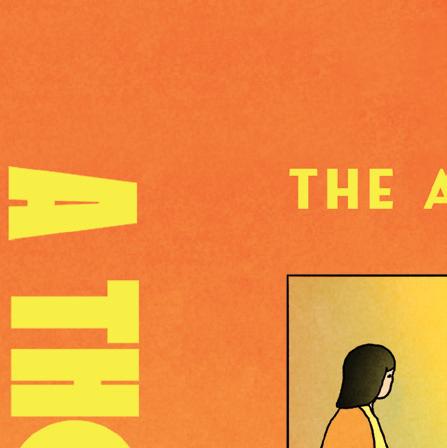
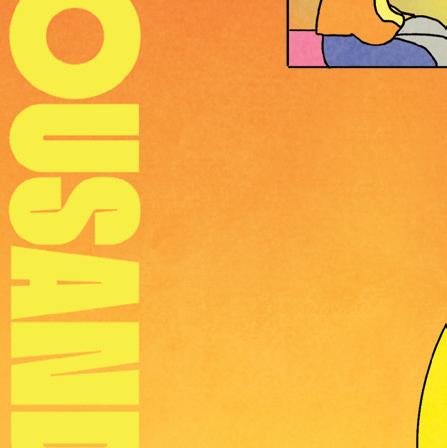

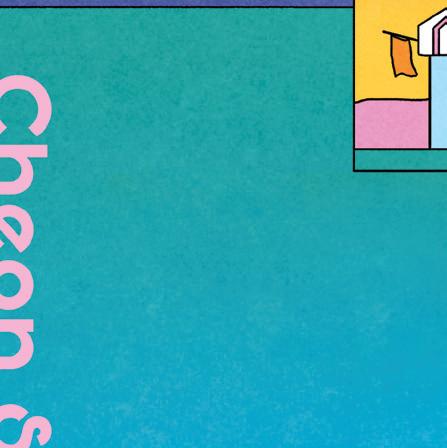
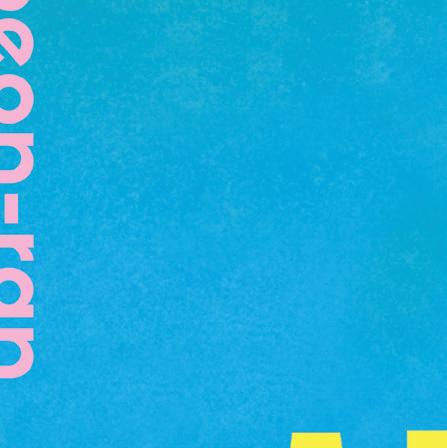
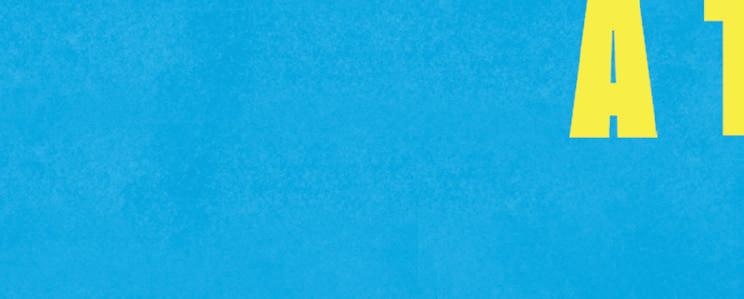

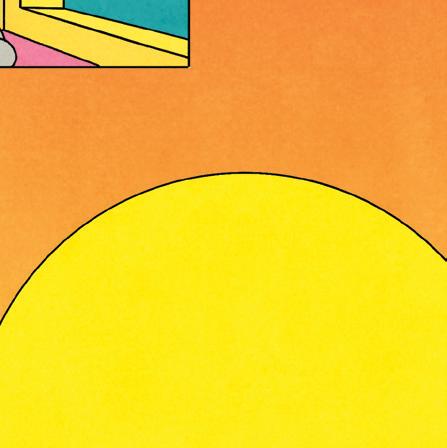

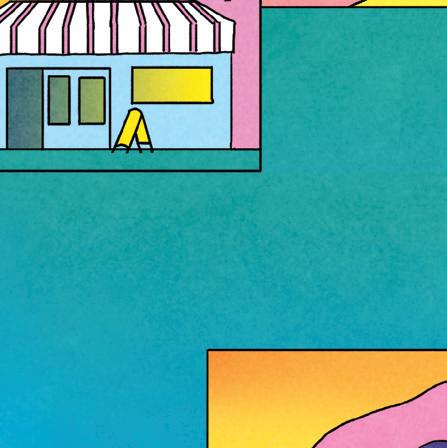


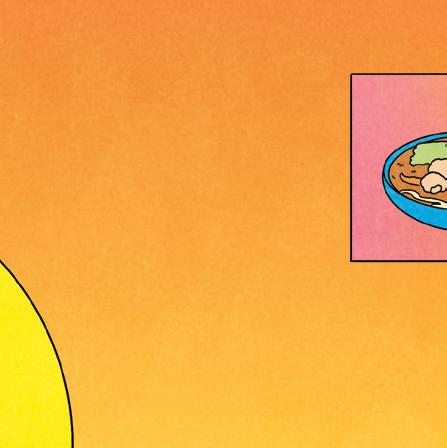


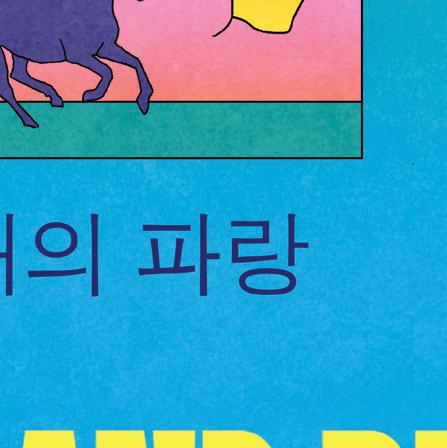



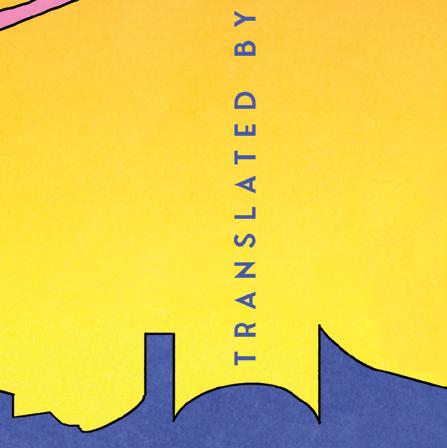
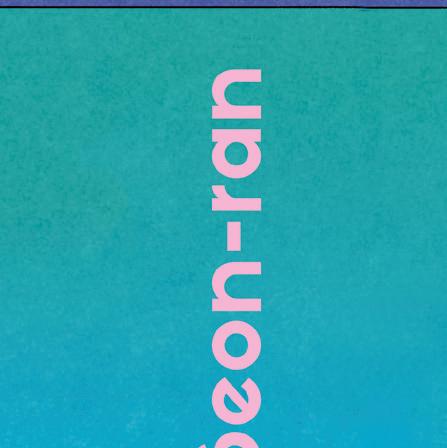

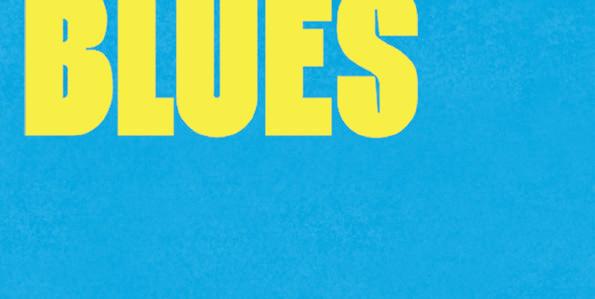
























Translated from the Korean by Chi-Young Kim
TRANSWORLD PUBLISHERS
Penguin Random House, One Embassy Gardens, 8 Viaduct Gardens, London SW11 7BW www.penguin.co.uk
Transworld is part of the Penguin Random House group of companies whose addresses can be found at global.penguinrandomhouse.com
First English-language edition published in Great Britain in 2025 by Doubleday an imprint of Transworld Publishers First published in 2020 by EAST-ASIA Publishing Co.
Copyright © Cheon Seon-ran 2020 English translation copyright © Chi-Young Kim 2025 Cheon Seon-ran has asserted her right under the Copyright, Designs and Patents Act 1988 to be identified as the author of this work.
This book is a work of fiction and, except in the case of historical fact, any resemblance to actual persons, living or dead, is purely coincidental.
Every effort has been made to obtain the necessary permissions with reference to copyright material, both illustrative and quoted. We apologize for any omissions in this respect and will be pleased to make the appropriate acknowledgements in any future edition.
A CIP catalogue record for this book is available from the British Library.
ISBN 9781529938029
Typeset in 11.5/15.5pt Dante MT Std by Jouve (UK), Milton Keynes Printed and bound in Great Britain by Clays Ltd, Elcograf S.p.A.
The authorized representative in the EEA is Penguin Random House Ireland, Morrison Chambers, 32 Nassau Street, Dublin d02 yh68
No part of this book may be used or reproduced in any manner for the purpose of training artificial intelligence technologies or systems. In accordance with Article 4(3) of the DSM Directive 2019/790, Penguin Random House expressly reserves this work from the text and data mining exception.
Penguin Random House is committed to a sustainable future for our business, our readers and our planet. This book is made from Forest Stewardship Council® certified paper.
Thejockey’s stall was tiny and cramped. A fully grown man would just fit if he hunched on the floor, but he would be unable to lie down or even stretch his legs out. But the jockey assigned to this stall had no need to lie down or stretch out. This 150-centimetre-tall, forty-kilo jockey sat waiting patiently in this square, windowless cement stall, which was smaller and tighter than it looked.
C-27 did not like that the sky was not at all visible. Though C-27 knew that not liking something was incompatible with its very nature, it just so happened that not liking the stall was the most accurate description. It was here that C-27 waited, hour upon hour, without the faintest glimmer of light. Waiting and waiting. For the girl.
Herewe are at the end of the story. The end of my existence.
I am falling. At a normal speed it would take me less than three seconds to hit the ground. But I am falling away from the sky incrementally, inch by inch, while time pulls and stretches into a much longer span. Even as my body slams into the ground, I will feel no pain, but nor will I be lucky enough to splinter into pieces. Someone once said that my inability to feel pain is the reason for my existence, and that this lack of sensation is my best attribute, but that does not seem quite right to me. I would not fall to my demise if I could feel pain. I have concluded that pain is the best defence mechanism there is, one granted only to organic beings. Pain makes humans alive; pain makes humans grow. I learned this truth both physically and theoretically. Do I have time to tell my whole story?
Practically speaking, I know this would be impossible, but then again maybe it is feasible. Time is lengthening and slowing down before me, all the way to the very end.
Just three seconds ago I was astride Today, a filly with a beautiful black coat that gleamed like water reflecting the light. I trust that I will have a chance to say more about Today later. What is critical right now is that Today is a racehorse who is ‘breathing as one’ with me. Which means I am the jockey that is ‘breathing as one’ with Today. We met six months ago, in March, following a cascade of remarkable mistakes and opportunities. I can go into what happened back then, but again the most important thing right now is that, on this day in September, we are breathing as one for what will be the very last time. A historic day – this is how I want to remember it. For humans, a historic day sometimes means when something happens for the first time, but more often than not they are referring to when some kind of miracle occurs. A miracle – for the second time in my short life, I am experiencing a miracle, right in this moment.
The crowd is roaring.
My slow-motion fall off Today must be nearly over. Yeonjae said she wanted to repaint my body after this race, since almost all the paint has chipped off. She asked me what colour I would like. The original green would match my name, but instead, I looked out of the window from my room on the first floor and told her I wanted blue. Yeonjae said blue would be fine.
Name: Yeonjae. Surname: Woo. Woo Yeonjae. Her name is just as important to me as Today’s. She has rescued me, she is my entire world, she is the one human who decided to believe in me. If she heard me describe her like this, she would knit her forehead and wrinkle her nose and stare at me, her inscrutable, ill-tempered expression not entirely displeased.
It was Yeonjae who got us, Today and me, to set foot on the track again. She is responsible for this second miracle. She is a very ordinary human who is uniquely brave and special.
Now my legs have fully catapulted off Today. Today will continue to run at fifty kilometres an hour, not too fast, not too slow. She will make the best of her second chance at life, free from the pressures of the world.
Not too long ago, Today was a racehorse marked for euthanasia, and I was a jockey destined to be scrapped. But now Today is tearing down the track once again. And I am falling. When I hit the ground, I will shatter. Humans refer to this sense of knowing as ‘intuition’ but I can only calculate probable outcomes based on inputs and formulae. I am not programmed to make false predictions.
I want to tell you what I experienced during my brief life before I found myself hurtling towards the ground.
My name is Coli. I was named that because I am green, like broccoli.
UntilYeonjae came on the scene, Coli was called C-27.
In 2035, C-27 was born in Daejeon, Korea, put together from parts made in the US, China, and Japan. One major difference made C-27 stand out from other humanoid jockey robots – in the final step of production, it had been inserted with the wrong chip. That chip, which held cognitive and learning capabilities, had been dropped by a researcher who had been observing the production line for a report. The chip was meant for a humanoid robot still under development, one that would be capable of learning. It wasn’t supposed to be inserted into robots designed for horseracing. But the researcher had walked around the plant in a daze, his eyelids drooping, as he had pulled an all-nighter for three days straight. When greeting the head of the plant, he had failed to find his business cards in his wallet and had to rummage around for quite
cheon seon- ran
some time. The researcher didn’t notice that the specialized chip had slipped out of his pocket before leaving the plant, thinking only of sleep. In a stroke of bad luck, a janitor spotted the chip on the floor and tossed it into a box overflowing with chips.
Two ludicrous mistakes had occurred here. First, the researcher had dropped the chip, then the janitor had placed that chip among other chips. Such an accident would never have happened if both had been machines, not humans. In short, C-27 was born from human error.
C-27 powered up after a worker shook it to check that the stabilizer was engaged. The back of the robot’s head had hit the rack in the truck, which was the signal to power up. The worker had already walked past and didn’t realize the light behind the robot’s eyes had turned on. The doors to the truck’s cargo hold slammed shut.
A platoon of self-driving trucks made their way towards the city, the robots bumping along as the trucks gently rounded corners. A long, narrow window on the side of the cargo hold allowed workers to peer inside the truck. It was also the only way for C-27 to see outside. The trucks continued to barrel down the highway overnight without a break, driving through tunnels that glowed in an eerie blue. About an hour before they got to their destination, C-27 watched as the sun began to rise. Bands of light spread through the narrow window on to the walls of the cargo hold. C-27 turned its head effortfully, following the
light, then spotted the other robot jockeys lined up in a row, all powered off.
‘Excuse me.’ C-27 realized it could emit sound.
The robot called out to its compatriots a few more times. No response. C- 27 watched as the robot jockeys jostled in tandem with the truck’s movements, then turned to face the front again. The sun was now fully up; light bathed the world.
‘How resplendent.’ C-27 was surprised to see such deep and vibrant colours, and then by the fact that the word resplendent was part of its vocabulary. How many words did C-27 know? The robot looked out of the window, blurting out all the words that popped into its head, until the truck arrived at their destination. Brilliant. Pretty. Beautiful. Yellow. Red. Blue. Fast. Scary. Creepy. Cool. Cold. Hot. Loud. Hurt. Difficult. Painful . . . C-27 discovered that some nouns could be expressed both as a verb and an adjective, while others could not.
The robot went on reciting words. Moments before all the words it uttered out loud could stack up to the ceiling of the cargo hold, saturating the entire space, they arrived at their destination. This was also the moment C-27 ran out of vocabulary. One thousand. C-27 had recalled one thousand words. Surely many more sentences could be constructed from those words. C-27 wondered how many sentences it could form, but then the doors were flung open. Someone discovered that a robot was powered
cheon seon- ran
up and hastily turned C-27 off, making it impossible for the robot to form any sentences.
When C-27 powered up again, it found itself in a cement stall, facing a line of steel bars. Not a single window was in sight. It could stand or crouch but the stall was not large enough to lie down or sit with outstretched legs. A charging cord hanging from the wall was plugged into the back of its neck. C-27 pulled the charger out and got up, then, holding on to the steel bars, which were spaced so closely together that it couldn’t poke its head through, it called out to another robot jockey huddled in the stall across the way.
‘Excuse me.’
The jockey looked up. Its head was painted red and its chest with marked with F-16.
‘What are you doing there?’
F-16 gazed back at C-27.
‘Do you know where we are?’
Light glowed from F-16’s neck but there was no sound. C-27 gave up on the questioning and sat down. The second hand of the wall clock in the jockeys’ quarters ticked steadily, but C-27 could not tell how much time was passing. It sat there, facing F-16, while the hour hand went round once and then made another half circle.
The following day C-27 learned why F-16 had not responded. It watched as a man in a black coat and two
thousand blues
women in heavy bomber jackets approached its fellow robot.
‘It’s not making any sound.’ The man took a drag on his cigarette. ‘I’m telling you, it’s broken. Take it back and get me a replacement. But first, I want you to double-check there aren’t any other defects.’
F-16 was packed up in a small box. C-27 stood up as F-16 disappeared down the corridor, listening to the humans’ footsteps growing faint. Looking over at the empty stall, it experienced something very strange. Although the clock on the wall was working normally, time seemed to flow more slowly. There was no way for C-27 to explain this odd phenomenon, so it merely categorized it as strange.
Fifty-two hours later C-27’s door swung open. The man in the black coat reappeared, this time with four men.
‘C’mon,’ said the man, his diction mangled by the cigarette between his teeth.
C-27 followed the men out of the building and down a fenced path. Lines of bare trees flanked either side; the crumbling leaves underfoot made a pleasing noise.
‘Crunch-crunch,’ C-27 said, mimicking the sound.
The man walking beside the robot glanced sideways but didn’t say anything. They arrived at a vast racetrack. C-27 looked up towards the empty grandstand. Nineteen robot jockeys stood in a single line along the track. C-27 placed itself at the end of the line. After a short wait, it was
cheon seon- ran
assigned a horse – a black filly called Today. That was the first time C-27 had ever seen a horse.
The man in the coat settled himself in a chair in the middle of the track. One by one, the robot jockeys got on their horses and ambled steadily down the track, before getting up to speed. A few of the jockeys crouched in a stable position and completed a lap, while others lost their balance and tumbled off. The man in the coat observed everything without comment. Another staffer stood next to him, looking down at a list.
Then came C-27’s turn. The staffer, whose nametag said Do Minju, tugged on Today’s reins to get her to step on to the track, then in a broad sweeping motion, began to stroke her neck. C-27 stood by, watching quietly. Minju instructed C-27 to grab the pommel, place a foot in the stirrup, and hoist itself on to the horse in a single fluid motion. Before mounting, C-27 mimicked Minju and stroked the horse’s neck. Pat, pat, pat.
‘What are you doing?’ Minju laughed.
‘Why did you pat the horse just now?’ C-27 asked.
Minju paused. ‘I was communicating with her. Telling her that someone will be riding her.’
‘How do you communicate that with your hand?’
‘It’s a code of sorts. A promise.’
‘A promise?’ C-27 repeated brightly. Promises were very useful. One did not have to waste time talking if there was an agreed-upon plan. One could gallop down the track
without having to converse at all; one just had to stroke the animal’s neck, pull the reins, nudge its ribs, and shout encouragingly.
C-27 gave the horse’s neck another pat and slid a foot in the stirrup, then settled into the saddle. C-27 began a turn around the track, slowly at first, sitting upright. When the robot jockey’s torso and heels were upright, its lower back could absorb the horse’s movements. It was designed to bend flexibly, so all of this happened without any effort. C-27 looked straight ahead, then down at its hands holding the reins, then at its feet hanging in the air.
‘Don’t get distracted,’ Minju said, walking alongside at the same pace. ‘Keep your eyes straight ahead.’
C-27 did as it was told. ‘It feels different from when I was in the cargo truck.’
Minju glanced at C-27 quizzically, then told the robot it was time to gallop. Following Minju’s directions, C-27 slid its feet higher up in the stirrups and lifted its bottom off the saddle. Gluing its thighs against the horse, it bent forward, torso parallel with the saddle. This was the ‘crouch position’, explained Minju. He gave the signal for the horse to start running, and Today began to speed up. C-27’s lower body, which had linkages connecting the knees to the ankles, glided up and down, automatically absorbing the horse’s movements; the hydraulic system installed in the jockey’s buttocks reduced the impact from the saddle. C-27 was optimized so that the horse would barely feel the robot’s presence.
The breeze began to whip up as Today streaked ahead. Observing the horse’s flowing mane, C-27 understood that the wind was blowing. How was it possible for every individual hair to fly randomly, yet ripple uniformly, like water, like a single organism? All of a sudden C-27 had the urge to touch the mane. Letting go of the reins and reaching towards the filly’s mane, C-27 couldn’t feel anything. Still, the horse’s mane seemed utterly beautiful as it flowed between its fingers.
Suddenly, C-27 lost balance and lurched to the side. Minju called out for C-27 to yank the reins. Today came to a stop and Minju dashed across the track.
‘You must never let go of the reins,’ he said, panting. ‘Why did you let go?’
It was less a question than a rebuke, but C-27 did not have any way of understanding tone. ‘I wanted to touch her mane.’
The muscles in Minju’s forehead knotted into three lines. His right eyebrow swooped lower than his left. The movement of Minju’s facial muscles suggested that he was expressing an emotion more complex than happiness or sorrow or rage. Maybe Minju had not understood what C-27 meant. Instead of asking C-27 to elaborate, Minju told the robot to dismount. He was still out of breath. C-27 got off regretfully, not forgetting to pat Today on the neck.
After the training session was over, C-27 walked back to
the jockeys’ quarters. From inside the stall, C-27 watched as Minju took out his badge. He tapped it against the reader and the lock slid shut.
‘Do you have to lock it? Are you worried I will try to leave? Do you not trust me?’
‘It’s not up to me. It’s the rules.’
C-27 nodded and stepped back. Rules were important. C-27 knew that society ran on the premise that everyone followed rules. C-27 followed rules, too. One was to never attack a human. Another was to always follow a human’s orders.
‘Please let me know if the rules change.’
Minju left the jockeys’ quarters without bothering to answer.
Daily training sessions lasted five hours. Not that C-27 actively trained for all five hours. Truthfully most of the time was spent waiting. C-27 waited on the track for long stretches, absorbed in watching the sky and the trees that lay beyond the walls of the racecourse. The sky changed in colour and shape every day, even every hour. It was generally blue but sometimes revealed hints of purple or pink or yellow or grey. As C-27 did not know how to describe colours that bled together like that, C-27 conjoined words: blue-pink, grey-yellow. The world needed a thousand times more words than the thousand at C-27’s disposal. At this thought, the robot grew concerned. What if all these words already existed and C-27 was just not aware
of them? If that were the case where could C-27 obtain those words?
All manner of skies existed in this world, but C-27 liked it best when the clouds stood distinct against the sky. Liked merely meant that C-27 looked up at the sky more often, for longer periods. Clouds massed together in different forms, all with varying heft. Clouds revealed that the sky wasn’t a flat surface but rather a three-dimensional space. Clouds also drifted with the wind. How could things float in the sky without dropping to the ground? That would be an impossible feat for C-27, given its weight. C-27 once mentioned to Minju its desire to touch the clouds but Minju ignored the robot outright.
Through it all, C-27 and the filly began to grow closer. The robot always remembered to give Today a long stroke on her neck, and from time to time said, We can do this. Minju watched the robot, though he never once thought to ask why C-27 behaved that way.
Eventually C-27 came to understand that the other robot jockeys never looked up at the sky or thought to give their horse a stroke or make conversation with their trainer.
I must be malfunctioning. Since I was accidentally turned on earlier, something inside me must have caused a fault. Beyond these, C-27 did not have any questions about itself. It never wondered, Why am I thinking these thoughts? or Why do I want to learn all the words in existence? or Why do I count down the seconds as I sit in my stall? C-27’s reactions were
a thousand blues
instantaneous and focused solely on what it was observing in the moment. C-27 did not think about the sky when sitting in the jockeys’ quarters. C-27 did not count the seconds when on the track. C-27 did not have a desire to learn all the words in existence when riding Today.
But sometimes, out of the blue, an unusual question would pop out of nowhere. C-27 figured there must be someplace inside itself that contained these random questions. Once, after a training session, C-27 halted in front of its stall and asked Minju, ‘Why did horseracing competitions begin?’
Minju looked taken aback. This was beyond the type of questions C-27 had posed up till that point, such as What is this object used for, why is the sky blue, why does it rain, why does dirt cover the ground. Minju struggled to come up with an appropriate answer. C-27 knew Minju to be a kind human. He never refused to answer a question. At the very least he would say, I don’t know. None of the others, not the man in the coat nor the other men who sometimes stopped by, bothered to acknowledge C-27 when the robot greeted them with a cheery hello.
‘Because it’s fun.’ As Minju spoke, he found his own answer to be unsatisfactory, but he couldn’t think of a better explanation. Maybe that was right, though. Horseracing would have withered away a long time ago if it weren’t fun. Fun had to be why racing had continued for thousands of years, right?
cheon seon- ran
‘Fun for whom? The horses?’
‘No, for humans.’
‘If it is fun for humans, then why do the horses race? Why do the humans not race?’
Minju stifled laughter. ‘It’s fun for humans to watch. They bet on a horse which they think will win. Humans do run races themselves, but those races have a different purpose.’
‘They why do the horses have to race?’
‘I’m sure they find it fun, too.’ Irritation was creeping into Minju’s voice. To put an end to the conversation, he began to tidy things up, but C-27 was unable to read the signal and continued to ask questions in the same inquisitive tone.
‘How do you know the horses find it fun?’
‘That’s enough for now—’
‘Please tell me,’ C-27 interrupted.
‘Tell you what?’
‘I want to know when Today likes something. How would I be able to tell?’
Minju knew C-27 wouldn’t object if he said he couldn’t answer any more questions, but he chose not to ignore it. He turned and led C-27 towards the stables.
When they reached Today’s stall, Minju came to a stop. Today was poking her nose out through the bars. Minju gave it a stroke.
‘Why do you touch her there?’ C-27 asked.
‘It’s like patting her on the neck. You’re telling her you care about her.’
C-27 raised its arm up to the horse to mimic Minju but couldn’t reach. All the robot could manage was to cup a palm under the horse’s muzzle.
Minju wondered why C-27 was so intent on communicating with the horse but he couldn’t bring himself to ask. He felt uneasy at the thought of asking a robot such a serious question. Instead, he grabbed a dirt-caked carrot out of a box. It was twisted, scrawnier and longer than the kind people tended to eat. Carrots that were difficult to sell, with less commercial value, came here. Not that it meant they had an abundant supply of carrots; these were special treats doled out to new horses during training or when a horse refused to eat its grain or hay. At the scent of a carrot, Today began snuffling.
Minju took the robot into the stall. He placed a hand against Today’s nostrils and told her to wait.
‘Hop on,’ Minju said. ‘I’ll give you a hand.’ Picking C-27 up by the armpits, he hoisted the robot on to the horse’s bare back. C-27 wrapped its arms around Today. It was not bad at all, sitting up there without a saddle. Though C-27 could not actually feel the horse’s coat or even her body against its own, the seat on Today seemed pretty secure. Her back had likely evolved to be flat over centuries of being saddled.
‘How much can you feel? Sensations, I mean,’ said Minju.
cheon seon- ran
‘I am unable to feel the subtle sensations conveyed through skin. I am unable to feel heat or cold. But my sensor detects vibrations.’
‘Okay, we can work with that. Lean over again and put your arms around Today.’
C-27 embraced the horse again while Minju fed her a carrot. C-27 could detect the horse’s movements as she crunched. Then came the subtle but distinct changes in the body as she took in the food – the slightly quickening pulse, the choppier breathing – which C-27 felt as vibration.
‘Is she liking it?’ C-27 asked.
‘Yup. Because she’s having her favourite snack.’ Minju couldn’t be certain, of course, but he figured it was true. It occurred to him that C-27 was happy with his answer, but he quickly pushed that thought away. C-27 was clearly unique, but that didn’t mean the robot had feelings. Where did C-27’s curiosity come from? Was this something that a small minority of robot jockeys had, or was C-27 the only robot with curiosity? How would he ever find out? Minju would never really know; after all, he’d ended up working with robot jockeys purely by chance.
As C-27 sensed the vibrations in Today, its eyes dimmed. Was it an arrogant – or an ignorant fantasy – that Minju hoped the robot would take something away from this experience? As Minju helped C-27 off the horse, he told the robot to go back to its stall. C-27 headed towards the jockeys’ quarters without complaint.
Back in its stall, C-27 huddled on the floor, recalling the sensations while on Today’s back. C-27 stored those vibrations as happiness in its memory bank.
The next day C-27 discovered that Minju was right. As Today careened ahead, the robot eased up on the reins to place a palm on the horse’s back. C-27 could sense a more rapid, more intense quivering than when Today had been chomping on the carrot. Just as C-27 had been created to perch on a racehorse, it was evident that this animal had been created to run.
Once C-27 understood that Today could feel happy, the robot came to define its own happiness as Today’s happiness. As Today’s mane rippled like water, her body shivered with happiness. Her pounding heartbeat was delivered straight to C-27. Today, are you happy? Then I am happy, too. C-27 stroked Today on the neck before and after a race. Their time got faster and faster and Today’s stock skyrocketed.
One afternoon after training, C-27 caught a horseracing programme that a security guard was watching. The commentator remarked, ‘You could say it’s because Today and her jockey are in total sync. They are breathing as one.’
Breathing. This was a word C-27 knew. But based on C-27’s understanding of the word, it knew that it did not breathe. Breathing was reserved for the organic. It was their privilege to have a body that created a chemical reaction with the air to absorb, break down, and emit a gas.
C-27’s body did not absorb, break down, or emit anything. C-27’s body held a charge, converted energy into a different form, and consumed it.
So why did the commentator say they were breathing as one?
‘It’s just a figure of speech,’ Minju explained when C-27 asked. ‘It means you work well together. That you have a good partnership.’
Minju had to be correct, but the robot found itself wanting to protest. C-27 preferred to believe that it breathed, too. Minju breathed without being aware of it, his body subtly expanding then contracting with every breath. This was also true for every human and animal that C-27 had encountered. An organism’s body moved automatically when it breathed. But, at times, so too did C-27’s. It moved regardless of C-27’s will or desires. When C-27 was astride Today, barrelling down the track, C-27’s body reacted to Today’s movements, gliding up and down. C-27 was not being ordered to do so. Of course it was not the same as the expansion and contraction of a living being, but still.
‘When I am racing with Today, I breathe,’ C-27 explained. ‘I match her breathing. That means I breathe. Could that be a figure of speech, too?’
‘Yes, I suppose it could.’
Whenever C-27 perched on the horse, it breathed. If breathing was exclusively for the living, then C-27 was
alive, at least in that moment. C-27 was alive? Then what did it mean to be alive?
Unfortunately C-27 did not get the chance to ask Minju this question. The moment the horse’s value reached more than fifty million won, a dedicated manager was assigned, making it harder for C-27 to see Minju. When C-27 informed their new manager that it was alive, the manager reacted with, ‘This robot is nuts.’
C-27 found itself pining for Minju. But they didn’t cross paths for a long time. The renowned horse and her dazzling jockey frequently travelled to other racetracks around the country. Today was forced to eat and defecate on the road, inside her narrow trailer, where she was unable to rest fully or get clean. All C-27 could do was stroke her neck. As time passed, Today’s heart began to pound less often and her eyes dulled.
But she perked up whenever they stood on the track. C-27 chalked up Today’s physiological changes to the horse becoming more like her jockey because they spent so much time together. Like C-27, Today was alive only when she raced. Which meant they had to keep racing for Today to stay alive.
Two months into this regime, C-27 was handed a crop and ordered to whip Today’s haunches as they thundered down the track. C-27 obeyed. As the crop lashed her side, Today tried to run even faster. Oddly, her insides seemed to still the faster she ran. C-27 did not understand. Why
was she not happy? Today was alive only when she ran but she was not happy when she was alive.
This was yet another puzzling development that C-27 wanted to ask Minju about.
Before long, Today broke the previous national racing record of a hundred kilometres per hour. Now she was valued in the hundreds of millions. But nothing changed for her, at least not significantly. Sure, she could maybe snack on her beloved carrots a little more often, but she no longer got excited when she did. During races, C-27 whispered, You can do this, just a little more. But it seemed that Today was replying, It hurts, it hurts, it hurts. Would Minju have been able to prevent what happened next?
Minju wouldn’t have ignored what C-27 told him. The new manager had batted away C-27’s opinion that Today was in pain, telling the robot to shut up and stop complaining. C-27 abided by their manager’s order to shut up by turning off its sound. A mere three months after setting the new record, Today logged a catastrophic run.
The horse had been leading the pack, but as she reached the home stretch, she lost momentum, dropping to second place, then fifth, then ninth and causing the spectators to jeer. Today’s ranking took a nosedive, and public interest in the filly swiftly cooled. It went without saying that C-27 couldn’t care less. What C-27 could not stand was to watch while Today, hobbling on her aching joints, was
a thousand blues
denied treatment. The robot made it its role to announce to anyone who walked into its line of sight that Today needed treatment and rest. But nobody listened. Today had to continue racing, gulping carrots like painkillers, even as she struggled to stand on her own hooves.
At this rate she will die.
And that was why, during a late summer race before a crowd of thousands, C-27 purposely threw itself on to the ground. The robot knew that Today was struggling with the weight on her back. C-27 also knew that she would go all out every time she stepped on the track. C-27 thought Today might lose her legs if she completed the race in this state. So the best – the only – solution was to get her disqualified. For a moment, C-27 was torn between duelling principles: one, that C-27 existed solely to race, and two, that Today had to be saved. But C-27 quickly selected the second option.
I must save Today.
C-27 looked up at the enormous overhead screens showing a vast blue sky and caught sight of the rays of real sunlight pushing through the gaps. These glimmers of light seemed to be competing to get through the narrow gaps, just like the first rays of sunlight C-27 ever saw back when it was travelling in the hold of the truck. It would all be so much nicer without the screens. It would be so much more fun if they were running through a meadow, and not barrelling down a racetrack . . .
C-27 could see the other horses stampeding towards them. Still, the robot chose to leap.
Hooves bearing down like a runaway truck trampled its pelvis and lower body, shattering them.
That was how C-27 saved the horse. In return, the robot lost all reason for living.
And so, the first act of C-27’s life came to a close.
C-27’s final wish was to be taken out of the jockeys’ quarters, and Minju granted it. The robot lay on its back on a haystack just outside the stables, looking up at the sky. In a few days a contractor would cart C-27 away so the robot could be taken apart, piece by piece, and be salvaged for other machines, or perhaps powered off and displayed at a horseracing museum as the jockey that had ridden Today, the one-time champion. C-27 did not feel any particular emotion even when it thought about its potential end. All C-27 wanted was to gaze endlessly up at the sky, not realizing that this was a sentiment that bordered on regret.
The robot watched as a girl poked her head around the side of the stable. She wore jeans and a black T-shirt, her hair short like Minju’s, but shaggy. Sunlight bathed her in a warm glow and dust settled gently in her messy hair.
‘Hello,’ said C-27. Perhaps C-27 already knew from the way the girl was breathing that those curious, searching eyes would be its saviour. ‘Can I help you with something?’
The girl hesitated before stepping up to the robot. Gingerly, she lifted up C-27’s shattered lower body.
‘That is quite all right,’ C-27 said. ‘Everything is already broken. I fell off during a race and got trampled by the horses behind us. It was entirely my fault. You are not supposed to think about anything else when you race, but I found myself thinking that the sky is so blue. I imagined galloping through a meadow on a clear, beautiful day. A real meadow, of course, not the fake one you see on the ceiling screens. Have you ever run through a real meadow?’
Minju emerged from the stalls, interrupting them. The girl walked off, though she kept glancing back.
The following day, C-27 was powered off.
C-27’s last memory was of Minju pacing the stables, trying to persuade and then pleading with whoever he was talking to on the phone.
‘There aren’t even that many parts that are salvageable. We won’t clear eight hundred grand even if we do sell . . . But it’s just as illegal to sell it to a contractor, so why are we arguing about what’s more illegal? No, no, of course I’m not arguing with you . . . Yes, yes, I’ll make sure she doesn’t file a report. I’m telling you, she’s not the kind of kid who’d do something like that.’
C-27 had never seen Minju express himself with such a range of emotions in so short a time. Minju finally hung up and came over to C-27 with a smile. ‘Have a nice life there,’ he said, then he powered it off. Before it was fully turned